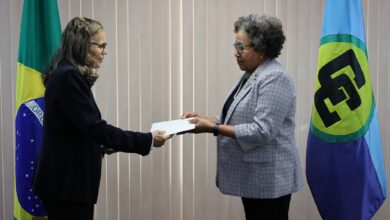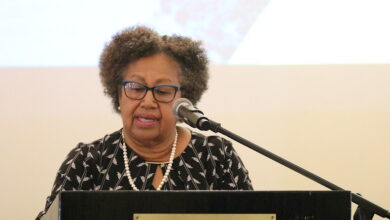Mr Chairman;
Honourable Prime Minister of Barbados;
Outgoing Chairman of the Council for Finance and Planning, Honourable Minister of Finance and Planning, Grenada;
Other Ministers of Finance and Planning;
Other Ministers;
Representatives of International, Hemispheric and Regional Organisations;
Representatives of the Private Sector;
Distinguished Delegates;
Staff of the Secretariat of the Caribbean Community;
Members of the Media;
Ladies and Gentlemen
In my capacity as Secretary-General of the Caribbean Community, I welcome you with great pleasure to this Sixth Meeting of the Council for Finance and Planning. I do this, fully cognisant of the historic significance of this room, which has seen much of the history of Dominica's role in the development of our regional integration process.
The convening of this Sixth Meeting of the Council for Finance and Planning today in Dominica is both propitious and timely. The COFAP, as you know, is a key Organ of the Caribbean Community and is charged in the new Treaty Establishing the CARICOM Single Market and Economy with a number of critical responsibilities such as:
– Removal of Restrictions to the Movement of Capital throughout the CSME (Art.40);
– Coordination of Foreign Exchange Policies (Art.42);
– Safeguarding the Balance of Payments (Art.43);
– Facilitation of the Right of Establishment and the Provision of Services, etc. (Art.44);
– Promotion of Initiatives for Disadvantaged Countries, Regions and Sectors, (Art.47), and the Establishment of the Development Fund,
to name a few.
Last year, when Ministers took the decision to have their Sixth Meeting here in Dominica, little did they know, however, that this Meeting would propel the Community into a new phase of deepened economic relations on the basis of a higher degree of economic policy consultation and coordination. This drives home the critical importance of effective functioning of our integration bodies with regular, well attended and fully participatory Meetings. The next stage of development of our Community will rely significantly on the effective functioning of this Body as indeed would our ability to respond to the likely shocks to which energy prices may be subjected in the face of the threatened increased instability in the Middle East.
The events of the last few months, however, show that the political will exists and that our leaders are prepared to consult and cooperate with each other on issues which hitherto had been deemed to be within the sovereign responsibility of each Member State. This is as it should be, for as we institute and deepen the arrangements for the functioning of our common economic space, the kind of consultation, collaboration and cooperation in which we have engaged over the past few weeks will become an absolute necessity if the intended benefits of our integration process is to be achieved and are to be distributed equitably among individual Member States.
In this regard, I must pay particular tribute to the Hon. Prime Minister of Barbados for his vision and guidance during this period. Also, I must commend the Hon. Prime Minister of Dominica for his faith in, and commitment to the regional ideal and for permitting the kinds of interventions by his peers in the management of the difficult economic situation in Dominica.
Mr Chairman, our efforts at economic policy coordination should, however, not reside only in the ad hoc interventions we have pursued in the past. Such an approach will not be adequate in this new dispensation of heightened inter-relatedness both regionally and globally.
The current situation challenges the Council for Ministers of Finance and Planning to urgently address the issue of the modalities for deepening economic policy coordination in our Community. The Revised Treaty of Chaguaramas sets out the framework for such cooperation. We now have to determine the procedures and rules whereby Member States would consult on their economic policies and policy developments and undertake to incorporate regionally agreed measures into their economic planning and implementation process. I call on this Council to rise to this challenge.
The technical work done to date to determine the regional economic stabilization and transformation programme is a start in this direction which now needs to be supplemented with explicit institutional and other arrangements for effective monitoring, consultation and cooperation within the policy arena. I hope that Ministers will mandate that this additional work be done without delay to support what we have already started.
The regional stabilization and transformation programme apart, Ministers have several other issues of critical importance to our Region's development on which to deliberate. These include the Regional Tourism Fund, the resolution of which should propel the tourism industry – a critical regional economic sector – onto a new industrial path of sustainable growth.
Given the one day available for these deliberations it is critical that we begin and carry out our work without delay any with despatch. I would therefore wish, in closing, to thank Mr. Swinburne Lestrade, Director-General, Dominica's Ministry of Finance and Planning, for his effective Chairing of the Meeting of Officials over the last two days. The outcome of that Meeting, especially its recommendations, should serve to speed the deliberations of this Sixth Meeting of the Council of Ministers of Finance and Planning of the Caribbean Community. With these few remarks, I wish the Council fruitful and productive deliberations as it ushers in a new era of deepened economic cooperation within our Community.
It is now my great pleasure to invite the Hon. Anthony Boatswain, Minister of Finance, Grenada and Outgoing Chairman of the COFAP to address you.
Thank You.






